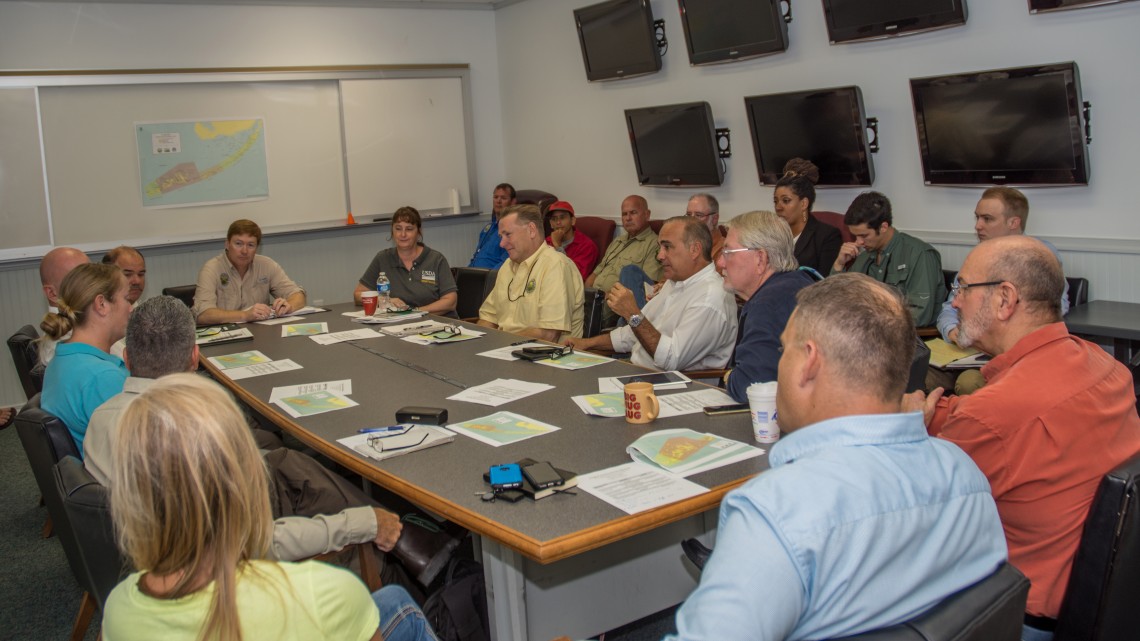Monroe County Provided Support in Successful Multi-Agency Screwworm Eradication Response In Lower Keys
MARATHON, FL – Monroe County was part of a six-month, multi-agency response that ended last month with the successful eradication of New World Screwworm, a flesh-eating fly larvae that infested several islands in the Lower Keys last summer, killed 135 endangered Key Deer and caused the County to be declared an agriculture state of emergency.
Monroe County’s Emergency Management participated in all phases of the eradication effort. Monroe County’s Florida Keys Marathon International Airport provided the Unified Command with a place to operate and conveniently deliver and distribute sterilized flies from Panama. Monroe County’s public works and solid waste helped in some operations. Monroe County Mayor George Neugent hosted three community meetings and Monroe County Public Information and Extension Services helped facilitate public outreach and a pet screening.
This was not a routine operation. This was the first outbreak of screwworm in Florida in about 50 years and the first infestation anywhere in the United States in 30 years. Screwworms are fly larvae that feed on living flesh and could greatly harm the state’s and the country’s livestock industries had they spread to the mainland.
“It was a scary situation to happen,” Neugent said Wednesday at the Monroe County Board of County Commissioners meeting in Marathon. “Agriculture Commissioner Adam Putnam pointed out, quite clearly, that bad things that could have happened if screwworm was not stopped in its tracks in Monroe County.”
An important milestone also was reached this week, with no confirmed screwworm cases occurring in the past 90 days. The milestone represents a significant reduction in the risk of reinfestation of the screwworm
Monroe County was dealing with the threat of Hurricane Matthew on Sept. 30, 2016, when the U.S. Department of Agriculture confirmed a local infestation of New World Screwworm in the endangered Key Deer herd on Big Pine and No Name keys. A couple of pets also had been confirmed with screwworm.
The USDA and the Florida Department of Agriculture and Consumer Services immediately put together a Unified Command to respond to the outbreak. Monroe County Emergency Management Director Marty Senterfitt participated as one of the three Incident Commanders.
Unified Command needed a place to operate and Marathon Airport Director Thomas Henderson facilitated the transformation of the Main Terminal’s 2,000-square-foot departure lounge into the Incident Command Post. This post was being mobilized at the same time Gov. Rick Scott was in the same room providing an update about Hurricane Matthew. At the peak of operations, about 25 employees from several federal, state and local agencies worked at the Incident Command Post.
The airport also seamlessly facilitated the delivery of sterile screwworm flies, a proven method for eradication. Two weekly flights from Panama arrived directly into the Marathon airport’s Customs and Border Protection facility, which had just opened five months earlier.
Additionally, sterile flies were stored in mobile refrigeration units parked on the Main Terminal ramp before being distributed in the field. Airport staff provided access to the ramp area for USDA and state employees. These activities created no significant impact on airport operations.
“The presence of our new CBP facility has proven to be a valuable addition to the Airport in even more ways than we had initially expected,” Henderson said. “This facility has proven it can be used for other emergency scenarios if it becomes necessary in the future.”
[livemarket market_name="KONK Life LiveMarket" limit=3 category=“” show_signup=0 show_more=0]

No Comment